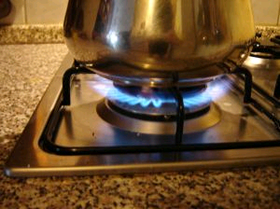Cooking Safety

The kitchen can be a gathering place for families, but it can also be one of the most hazardous rooms in the house for fires.
According to the National Fire Protection Association, two of every five reported U.S. home fires start in the kitchen, which is more than any other room in the home. The U.S. Fire Administration adds that almost half of all residential fires in the U.S. are caused by cooking. Cooking equipment is also the leading cause of unreported fires and associated injuries.
Tips
While cooking presents many fire hazards, these are basic tips to keep in mind to prevent kitchen fires:
- Always stay in the kitchen while cooking on the range, especially when frying food.
- Keep things that can burn, such as dishtowels, paper or plastic bags, oven mitts, wooden utensils and curtains at least three feet away from the range top.
- Keep your cooking area clean. Do not let grease build up on the range top, toaster oven or in the oven.
- If you are simmering, baking, roasting, or boiling food, check it regularly, remain in the home while food is cooking, and use a timer to remind you that you're cooking.
- Stay alert at all times while cooking. Do not cook if you have been drinking alcohol or have taken medicine that makes you drowsy.
- Keep pets off cooking surfaces and nearby countertops to prevent them from knocking things onto the burner.
- Wear short, close-fitting or tightly rolled sleeves
- Choose the right cooking equipment and make sure that it is used properly. Do not use equipment that has not been tested and approved, and make sure that you follow the manufacturer’s instructions when installing and using the equipment.
- Do not use an extension cord for cooking equipment. Cooking equipment can cause the circuit to overload, which could start a fire.
Keep these additional safety tips in mind when using grills:
- Barbeque Grills
- Only use barbeque grills outdoors. If used indoors, not only are barbeque grills a fire hazard, they also risk exposing occupants to carbon monoxide.
- Position the grill well away from siding, railings, and out from under eaves and overhanging branches.
- Place the grill a safe distance from lawn games, play areas and foot traffic.
- Keep children and pets away from the grill area.
- Put out several long-handled grilling tools to provide clearance from heat and flames while cooking.
- Remove grease or fat buildup in trays below grill periodically.
- Charcoal Grills
- Purchase the proper starter fluid.
- Store starter fluid out of reach of children and away from all heat sources.
- Never add charcoal starter fluid when coals or kindling have already been ignited. Also, never use any flammable or combustible liquid other than charcoal starter fluid to get the fire going.
- Propane Grills
- Check the propane cylinder hose for leaks before using it the first time each year.
- If you smell gas while cooking, immediately get away from the grill and call the fire department. Do not try to move the grill.
- Never store propane cylinders in buildings or garages.
- If you store a gas grill inside during the winter, disconnect the cylinder and leave it outside.
- If you suspect a leak, a light soap and water solution applied to the hose will reveal escaping propane quickly by releasing bubbles.
- If you determine your grill has a gas leak and there is no flame:
- Turn off the propane tank and grill immediately.
- If the leak stops, get the grill serviced by a professional before using it again.
- If the leak does not stop, call the fire department.
- All propane cylinders manufactured after April 2002 must have overfill protection devices. OPDs shut off the flow of propane before capacity is reached, limiting the potential for release of propane gas if the cylinder heats up. OPDs are easily identified by their triangular-shaped hand wheel.
- Turkey Fryers
Using an oil fryer to cook turkeys over the holidays has become increasingly popular. However, there are many hazards associated with using turkey fryers, and safety factors should be considered before deciding to use a turkey fryer. For those who choose to use a turkey fryer, the division offers the following safety tips:- Fryers can easily tip over, spilling hot oil from the cooking pot. Do not overfill the fryer with oil. If the fryer is overfilled, spillover may hit the burner or flames, causing a fire. Make sure that the fryer is used on a flat surface to reduce the chance of accidental tipping.
- Make sure the turkey is thawed before placing it into the fryer. Partially frozen or frozen turkeys increase the chance of a spillover effect. The turkey should thaw in the refrigerator for approximately 24 hours for every five pounds in weight.
- Make sure the fryer is placed outdoors and a safe distance from buildings and any other flammable materials. Never use turkey fryers in a garage or on a wooden deck.
- Never leave a fryer unattended. Most fryers do not have thermostat controls, which could potentially overheat the oil to the point of combustion.
- Use well-insulated oven mitts or potholders when touching the lid or handles on the fryer to avoid burns. If possible, you should also consider wearing safety goggles to protect your eyes from potential oil splatter.
- Never allow children or pets near the fryer, even if it is not in use. The oil inside a fryer can remain dangerously hot for hours after the initial use.
- When using a fryer, keep a fire extinguisher nearby. Never use water to extinguish a grease fire. If a fire is manageable, use your fire extinguisher. If the fire increases and becomes unmanageable, contact the fire department immediately.
